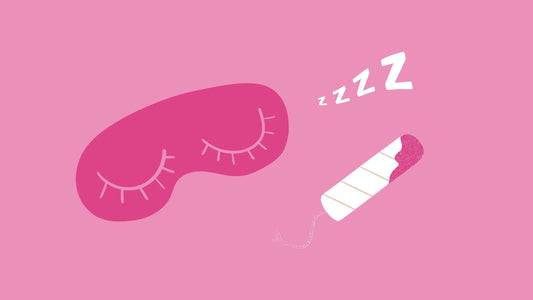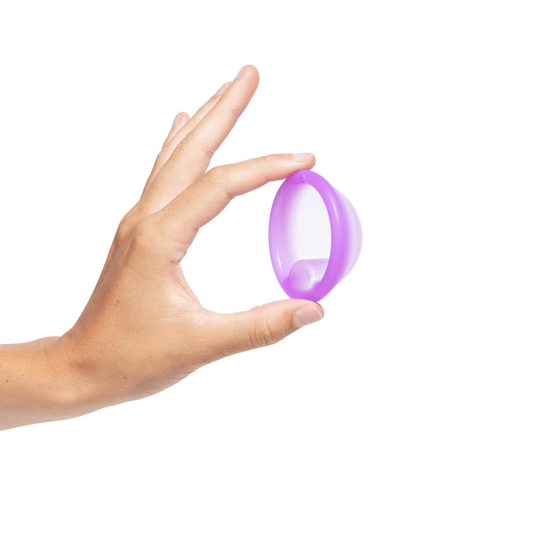
Birth Control Side Effects: The Pill
Share
The beginning of the pill
In the year 1960, the first hormonal contraceptive, Envoid, was approved by the FDA and began being marketed as "the pill" shortly after. Since then, many different forms of birth control have been created to help prevent the contraception of a child. Currently 14% of women in the United States ages 15-49 are using the pill.
Birth control comes in many different forms, but the most common form is the pill. If you are considering using the pill, you may be considering and weighing the side effects. Though birth control is highly effective in preventing pregnancy, there are many different side effects that can come along with taking the pill. This blog post will discuss how birth control pills work, different forms of the pill, and the side effects of birth control pills.
Keep in mind that everyone's body is different and reacts differently to birth control, so everyone will experience a different level of severity of these side effects, or none at all! If you decide the pill is best option for you, remember that sometimes it takes trying a few different prescriptions before finding which one works best with your body.
How do birth control pills work to prevent pregnancy?
Prevents ovulation
The main way birth control pills work is by preventing ovulation which is one of four stages of the female body's menstrual cycle. The pill disrupts this stage by preventing the body from releasing the egg from the fallopian tubes. This means that there is nothing for the sperm to fertilize, therefore you can't get pregnant.
Thickens cervical mucus
The pill also thickens the mucus around the cervix and makes it stickier. This makes it harder for sperm to swim through the cervix to reach an egg.
Thins the endometrium
Finally, the pill works to thin the uterus' lining, which is called the endometrium, so if the sperm does make it to the uterus, it is much more difficult to attach to its lining and implant itself. If it is not implanted, the necessary nutrients needed for survival are not supplied to the sperm to keep it alive.
Types of birth control pills
There are two types of hormonal birth control pills: a combination birth control pill that contains estrogen and progestin (which is a synthetic version of progesterone), and then there's the mini pill that contains progestin only.
The combination birth control pill is the most common type of pill prescribed and is taken every day. The mini pill is an alternative for women who cannot take estrogen for medical reasons, or just prefer to not take it. The mini pill must be taken at the same time each day and some brands need to be taken within a three-hour window.
The progestin-only pill doesn't stop ovulation as well as the combination pills, so it is less effective at preventing pregnancy. The mini pill also has a higher risk of breakthrough bleeding, which is when you bleed between your periods.
Birth control side effects: The Pill
Though birth control pills are simply tiny pills you swallow daily, they can have an immense effect on the female body. Since birth control is affecting your hormones to help prevent pregnancy, there is bound to be some side effects. We've gathered the most relative issues women deal with while on birth control...
Spotting between periods
Spotting is when vaginal bleeding occurs between menstrual cycles. This would look like light bleeding or brown discharge.
Spotting happens because the uterus is adjusting to having a thinner lining than normal. This is due to the birth control pills changing your hormone levels.
Nausea or vomiting
Many women report that they experience nausea in the first few months of taking the pill. What a drag. This is reported to be the most common side effect of the pill! This can be caused by the increased levels of hormones that the pill is putting into your body, and your body may need a few weeks or months to adjust.
This side effect is usually at its worst when you first start taking the pills. If you experience nausea, it's important to eat small meals throughout the day and avoid fatty or greasy foods. You can also try taking your birth control pill with food as you would other vitamins, minerals, and other medication. It may take changing to a different prescription of the pill or going off the pill completely to ease the nausea and/or vomiting.
Decreased sex drive
A decreased libido (sex drive) is a common birth control side effect for many women. Because sexual desire is primarily managed by the hormones in the body, an increase in hormones will affect sexual desire. For some women, this decrease in sex drive may be temporary and last only a few weeks or months. But for others, it may be long-term.
Breast tenderness
Wear your extra supportive bras ladies! Taking oral contraceptives often causes tender breasts. Along with that, the hormones you're taking can make your breasts grow bigger. Which could be a perk? But if not, it's nothing a little ibuprofen can't help with.
Headaches and migraines
Changes in your estrogen and progesterone levels can trigger the occurrence of migraines and headaches. This is why a lot of women go for the progestin-only pill which mitigates the headaches. If you find that you are getting migraines more frequently or they are worse than usual, you should speak with your doctor about changing birth control pills.
Acne
Some women experience an increase in acne when starting birth control, while others see their skin clear up. It all has to do with the type of birth control pill you're on and how it affects your body personally. The pill can help regulate your hormone levels and reduce the amount of testosterone in your body, which is often the cause for excess acne.
Weight gain or weight loss
This is our least favorite side effect and for good reason. Women's weight is highly connected to her sex hormone levels. If your hormones are off, you could start gaining weight. If your hormones are increased, you could lose weight at an unhealthy rate. Your sex hormones are controlled in your hypothalamus and so is your weight. It's the control center for everything!
Mood changes and/or swings
This side effect is one that your partner or roommates won't be keen for. Hormones play a HUGE role in a person's mood and emotions, so, when you're taking birth control pills that are changing your hormone levels, it's no surprise that your mood changes too.
In 2016, Denmark studied over one million women ages 15-34, and found evidence that women who use birth control have an increased risk for being diagnosed with depression and prescribed an antidepressant. This is a huge factor to keep in mind!
Missed Periods
Depending on the birth control pill you take, you can have very light or completely missed periods. This is always a tad bit concerning because your period is considered the fifth vital sign of the women's body.
Vaginal discharge
Changes in vaginal discharge can occur when taking birth control. There may be an increase in vaginal lubrication, or it may be nonexistent. These changes are usually nothing to worry about but if you experience any itching, burning, or unusual symptoms, speak with your doctor. Generally, birth control pills shouldn't change the color or odor of discharge, but if you do notice a change, check out our guide on vaginal discharge.
Potential vision loss
The hormonal changes while taking birth control can cause dry eye, and even the increased risk of glaucoma, which can be dangerous. Glaucoma can cause damage to the eye's optic nerve and can lead to permanent vision loss. This is because fluctuating hormones are the primary cause for worsening eyesight, especially with increased age. Sources on this specifically can be found here and here.
More dangerous risks with birth control pills
High blood pressure and blood clots
There is evidence to suggest that the pill can lead to hypertension and blood clots, which can lead to a stroke or heart attack. If you're familiar with Hailey Bieber, she just recently suffered a blood clot and a mini stroke which was suspected to have been caused by the combination of her birth control and other stressors.
Cancer
There is also evidence to suggest that the pill can lead to an increased risk of breast and cervical cancer. Research this topic to learn more!
So, there you have it! Those are some of the potential side effects of birth control pills. As always, please consult with your doctor before starting or stopping any form of hormonal birth control because it can drastically affect your body.
With this all said, the side effects of birth control vary from person to person. It is important to know your body and seek help or advice when needed.
There are many different types of birth control pills on the market, so if you're experiencing any negative side effects, talk to your doctor about changing to a different brand or prescription, or discuss a different form of birth control.
We care about women's health and want you to be as informed as possible! For more content like this, check out our website.
What are your thoughts on birth control? Have you ever experienced any negative side effects? What are the positives you've experienced? Let us know!
If you found this article helpful, please share it with your friends!
XOXO,
Garnuu Team








